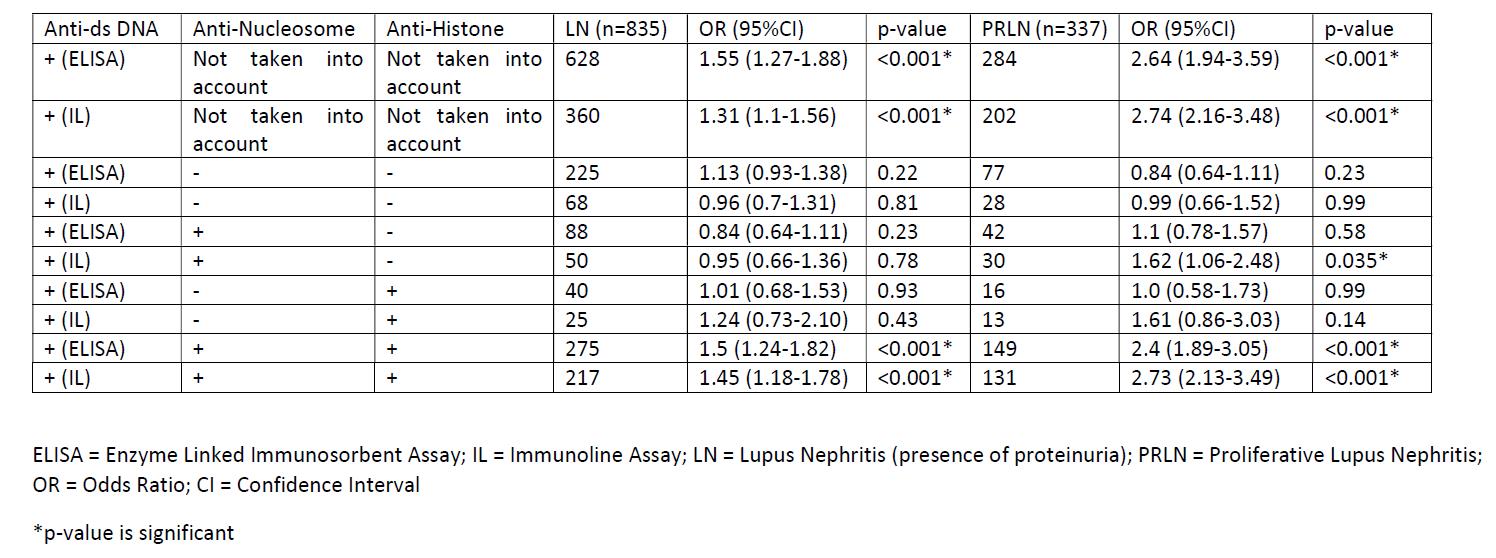Session Information
Date: Sunday, November 12, 2023
Title: (0543–0581) SLE – Diagnosis, Manifestations, & Outcomes Poster I
Session Type: Poster Session A
Session Time: 9:00AM-11:00AM
Background/Purpose: Anti-dsDNA antibodies (ADA) are traditionally measured by ELISA and are associated with Lupus nephritis (LN). Testing by immunoline assay (IL) provides additional information on antibodies to dsDNA, nucleosomes and histones which are all dsDNA associated proteins. Co-positivity for these antibodies in various combinations may have an association with diagnosis of LN, especially proliferative LN. This study aimed to assess if ADA by IL show similar association with proteinuria (i.e. lupus nephritis; LN) and proliferative LN (PRLN) as by ELISA and if co-occurrence with the other 2 antibodies have any impact on association with LN or PRLN.
Methods: Autoantibody profiles on IL and ADA values by ELISA (Euroimmune, Germany) of 2151 Indian SLE patients (F:M=1968:183; mean age=27.56 years) from the INdian SLE Inception Cohort for REsearch (INSPIRE cohort) at baseline were used. Among patients with LN (defined as per EULAR 2019 criteria; n=835), renal biopsy was available for 549 patients (337 PRLN; class III, IV, Mixed class III+IV and IV+V in 117, 149, 45 and 26 respectively). Autoantibodies against dsDNA (by both methods), nucleosomes and histones were tested for association with LN and PRLN either in isolation or in combination. Chi-square test was used to find association of individual and combination of autoantibodies with LN and PRLN. The results are expressed as Odds ratio (95% CI). A p-value< 0.05 was considered significant.
Results: ADA on ELISA and IL tested positive in 1499 (69.68%) and 843 (39.19%) patients respectively. A total of 1685 (78.33%) patients tested positive for ADA by at least one method and 749 (34.82%) patients tested positive by both the methods. Anti-nucleosome and anti-histone antibodies were positive in 950 (44.16%) and 791 (36.77%) patients. ADA results (ELISA & IL respectively) showed significant association with LN (1.55 (1.27-1.88); p< 0.001 & 1.31 (1.1-1.56); p< 0.001) and PRLN (2.64 (1.94-3.59); p< 0.001 & 2.74 (2.16-3.48); p< 0.001) but this association disappeared when re-tested after omitting the co-positivity for anti-nucleosome and anti-histone antibodies. Positivity for the other 2 antibodies either in isolation or in combination also didn’t show any association with LN and PRLN.
Double positivity for ADA (IL) and anti-nucleosome antibodies showed a significant association (1.62 (1.06-2.48); p< 0.05) with PRLN. Triple antibody positivity in both the groups (ELISA & IL respectively), showed significant association with LN (1.5 (1.24-1.82); p< 0.001 & 1.45 (1.18-1.78); p< 0.001) and PRLN (2.4 (1.89-3.05); p< 0.001 & 2.73 (2.13-3.49); p< 0.001). (Table-1)
Positive predictive value (PPV) of ADA by ELISA for LN vs PRLN were 41.89% & 42.7% respectively as compared to ADA by IL (18.94% & 23.96% respectively). These were lower than the PPV for triple antibody positivity for LN and PRLN for ADA by ELISA (45.99% & 45.78% respectively) and for ADA by IL (24.87% & 27.63% respectively).
Conclusion: Anti-dsDNA antibody positivity in isolation (ELISA or IL) doesn’t have any association with LN or PRLN. Their association with LN and PRLN appears only when antibodies to nucleosomes and histones are co-positive with them and the odds of developing renal involvement increase significantly.
To cite this abstract in AMA style:
Gupta R, Aggarwal A, Jain A, Rajasekhar L, Kavadichanda C, Shobha V, Mathew A, Ghosh P, Das B, Rathi M. Autoantibodies to dsDNA and Associated Proteins: Association with Proteinuria and Lupus Nephritis [abstract]. Arthritis Rheumatol. 2023; 75 (suppl 9). https://acrabstracts.org/abstract/autoantibodies-to-dsdna-and-associated-proteins-association-with-proteinuria-and-lupus-nephritis/. Accessed .« Back to ACR Convergence 2023
ACR Meeting Abstracts - https://acrabstracts.org/abstract/autoantibodies-to-dsdna-and-associated-proteins-association-with-proteinuria-and-lupus-nephritis/

